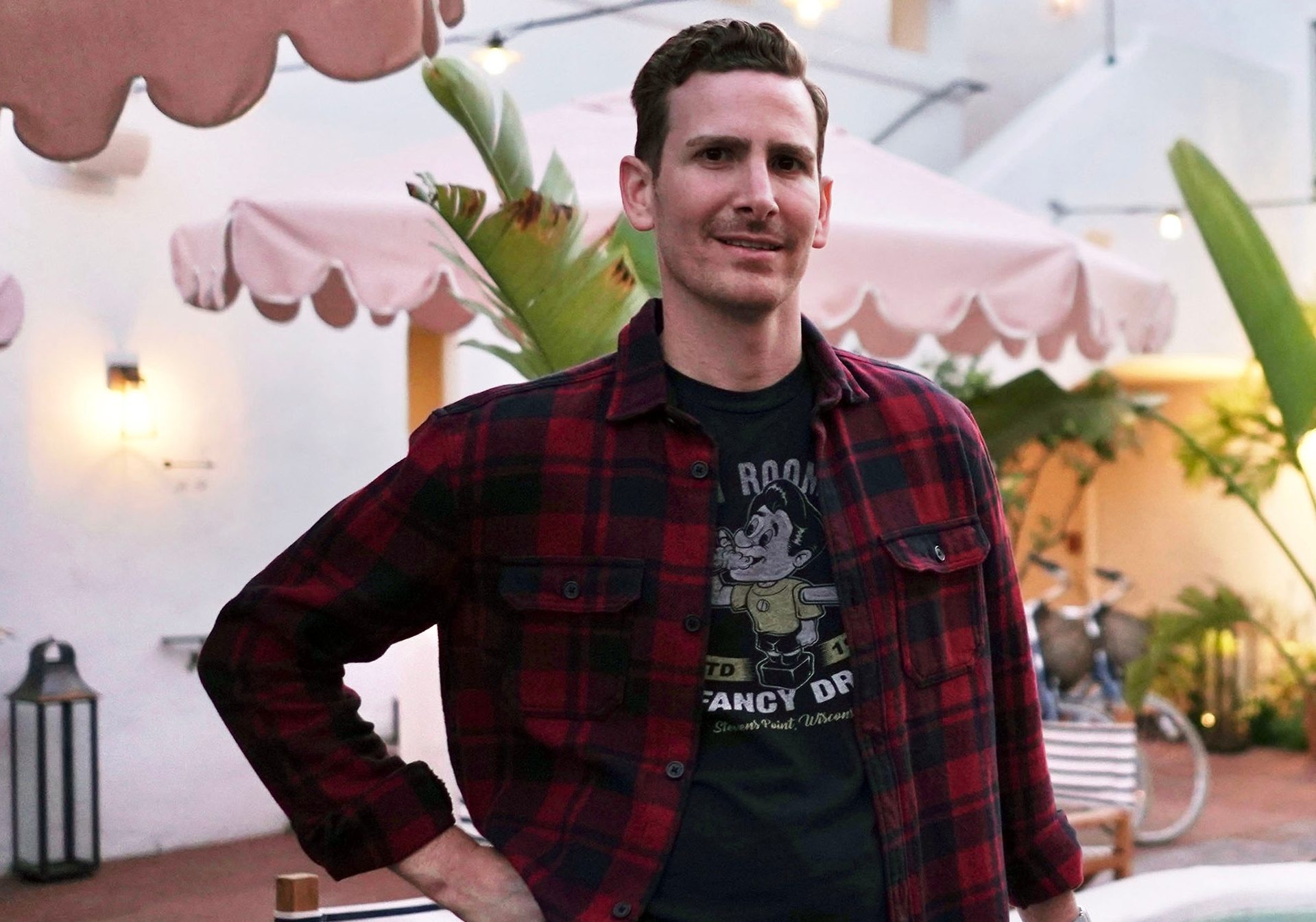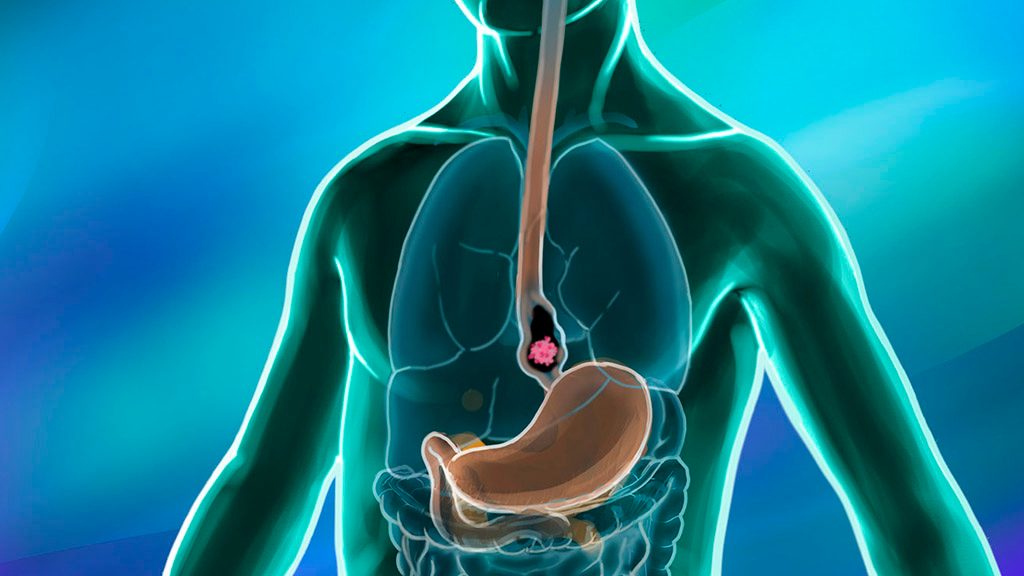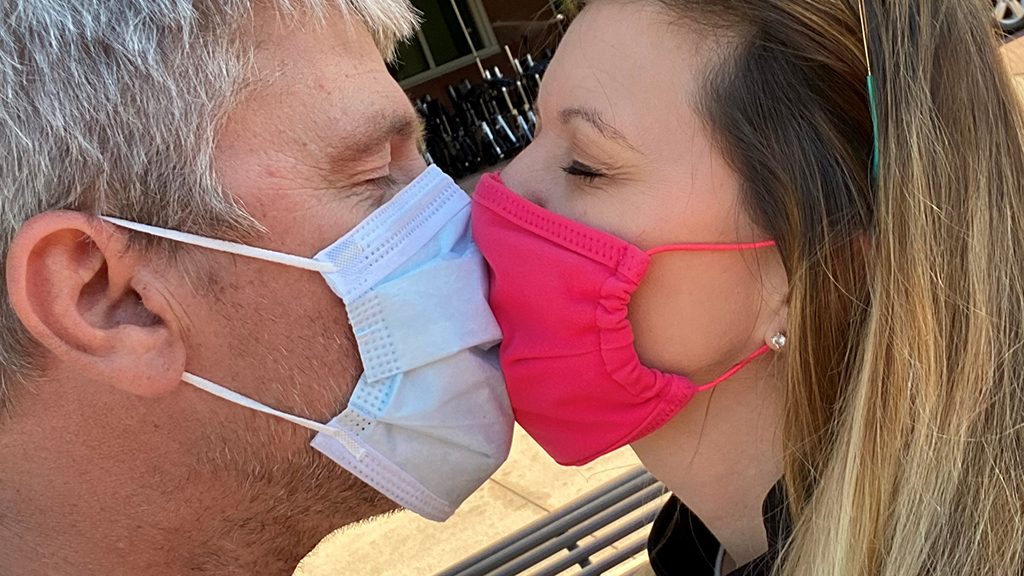request an appointment online.
- Diagnosis & Treatment
- Cancer Types
- Esophageal Cancer
Get details about our clinical trials that are currently enrolling patients.
View Clinical TrialsEsophageal cancer is a type of cancer that occurs when the cells lining the esophagus mutate and grow uncontrollably. In some cases, the cancer can grow through the esophageal lining and penetrate the esophageal wall.
Esophageal cancer is a type of cancer that occurs when the cells lining the esophagus mutate and grow uncontrollably. In some cases, the cancer can grow through the esophageal lining and penetrate the esophageal wall.
The esophagus is a foot-long, hollow muscular tube that connects the back of your throat to your stomach. When you swallow, the esophagus carries food and liquids to your stomach for digestion.
According to the National Cancer Institute, more than 18,000 Americans are diagnosed with esophageal cancer each year. Because esophageal cancer often has no symptoms in the early stages, it is usually detected at a more advanced stage and becomes more challenging to treat.
Types of esophageal cancer
There are different types of esophageal cancer, depending on the type of cell in which the cancer starts. The two most common types of esophageal cancer are:
- Esophageal adenocarcinoma
- Esophageal squamous cell carcinoma
Esophageal adenocarcinoma
The lining of your esophagus contains glandular cells that secrete mucus to lubricate the passage of food. These cells are concentrated in the lower esophagus, near the stomach. Adenocarcinoma is a type of cancer that begins in these gland cells. Heartburn, which is also called reflux or gastroesophageal reflux disease (GERD), is a major risk factor. Other risk factors include obesity, smoking and Barrett’s esophagus (see below). Adenocarcinoma is the most common type of esophageal cancer in the Western Hemisphere, especially in white males.
Esophageal squamous cell carcinoma
Squamous cells are flat cells that make up most of your esophageal lining. Squamous cell carcinoma, also called epidermoid carcinoma, begins in these squamous cells. It occurs primarily in the middle and upper parts of the esophagus, although it can develop anywhere. Risk factors include smoking and drinking alcohol. Squamous cell carcinoma is the most common type of esophageal cancer worldwide, although it is on the decline in the United States and Western Europe.
The following cancer types can also occur in the esophagus:
- Neuroendocrine tumors: Cancer that affects the hormone-producing cells of the esophagus
- Lymphoma: Cancer that affects the body’s immune system. Lymphoma does not start in the esophageal lining; it arises from the lymph nodes attached to the esophagus.
Symptoms
Signs of esophageal cancer are often not apparent in its early stages. If you have symptoms, they may include:
- Difficulty swallowing (dysphagia). As an esophageal tumor grows, it may start to block the passage of food. This is often the first symptom of esophageal cancer to appear.
- Painful swallowing (odynophagia)
- Indigestion and heartburn over long periods of time
- Pain, pressure or burning in the throat or chest
- Unintended weight loss
- Reduced appetite
- Black tar-like stools
- Anemia, or low levels of red blood cells, which carry oxygen throughout the body. This can lead to patients feeling run-down and weak.
- Vomiting
- Regurgitation of food from the esophagus
- Persistent hiccups
- Chronic cough
- Hoarseness
- Pneumonia
These symptoms do not always mean you have esophageal cancer. However, it is important to discuss any symptoms with your doctor, since they may signal other health problems.
MD Anderson is #1 in Cancer Care
Esophageal cancer risk factors
Anything that increases your chance of getting esophageal cancer is a risk factor. Esophageal cancer is often associated with repeated injury to the esophageal lining. It is also related to factors like age and hereditary conditions. Esophageal cancer causes and risks include:
Age: Most cases of esophageal cancer are in people over 55.
Gender: Men are three times more likely than women to develop esophageal cancer.
Long-term heartburn: Heartburn is a symptom caused by stomach juices with acid and bile coming into the esophagus. Acid reflux and gastroesophageal reflux disease (GERD) are the medical names for heartburn. Long-term heartburn is a factor in half of esophageal cancers.
Heartburn can be controlled by medication and sometimes surgery. Speak to your doctor to determine the best way to keep your heartburn under control.
Long-term history of smoking: Smoking damages the cell lining of the esophagus. Half of squamous cell esophageal cancers involve smoking. Smoking also increases the risk of adenocarcinoma.
Excessive alcohol consumption: The more alcohol you drink, the higher the risk for esophageal cancer. Combining smoking and drinking alcohol also increases the risk for esophageal cancer.
Barrett's esophagus: A history of uncontrolled heartburn may damage the cells lining the esophagus, especially near the gastroesophageal junction (where the esophagus meets the stomach). The damaged cells change to resemble intestinal cells, rather than esophageal cells. This is called Barrett’s esophagus. In some people, Barrett’s esophagus is a precancerous condition that can transform into esophageal cancer and needs to be watched closely.
Diet and weight: The risk of esophageal cancer is higher if you are overweight, tend to overeat or do not eat a healthy diet.
Exposure to chemicals: Lye ingestion or being around dry-cleaning chemicals are esophageal cancer risk factors.
Medical history: A history of any of the following may be associated with an increased risk for esophageal cancer:
- Squamous cell cancers related to tobacco use
- Head and neck cancer
- Oral human papilloma virus (HPV)
Medical conditions: Having any of the following may increase your risk for esophageal cancer:
- Achalasia: A disease in which the sphincter, or muscle, at the bottom of the esophagus fails to open and move food into the stomach
- Tylosis or Howel Evans Syndrome: A rare, inherited disorder that causes excess skin to grow on the soles of the feet and palms. Patients with this disorder have nearly a 100% chance of developing squamous cell esophageal cancer.
- Esophageal webs: Flaps of tissue which protrude into the esophagus, making swallowing difficult
Not everyone with risk factors gets esophageal cancer. However, if you have risk factors, you should discuss them with your doctor.
The best thing you can do to prevent esophageal cancer is to keep your heartburn under control, maintain a healthy weight, avoid smoking and only drink alcohol in moderation. Visit our prevention and screening section to learn how to manage your risk.
Learn more about esophageal cancer:
Why come to MD Anderson for your esophageal cancer care?
From the moment you arrive at our Gastrointestinal Center for your esophageal cancer treatment, our highly specialized physicians and support specialists make your care their priority. From individualized treatment to minimally invasive procedures to groundbreaking research, we are constantly striving to provide our esophageal cancer patients with better outcomes and hope for the future.
A team approach to individualized treatment
Our Tumor Board of experts from different esophageal cancer disciplines meets weekly to make recommendations about patient care plans. This means your treatment is not just a one-sized-fits-all recommendation: It is a thorough, personalized assessment developed by some of the nation’s leading cancer physicians. Additionally, our faculty members hold a variety of leadership roles in organizations such as the American Joint Committee on Cancer (AJCC), which establishes a system for esophageal cancer staging, and the National Comprehensive Cancer Network (NCCN), which establishes guidelines for esophageal cancer treatment.
Minimally invasive procedures
At MD Anderson, our experts specialize in minimally invasive procedures. For example, our endoscopic mucosal resection program for patients with very early stage esophageal cancer can preserve the function of the esophagus and stomach.
If your treatment plan includes surgery, our highly experienced surgeons work to ensure your quality of life after surgery will be excellent, allowing you to eat all types of food and return to normal activities.
Novel research
As one of the world's largest cancer research centers, MD Anderson is leading the investigation into new methods of esophageal cancer prevention, diagnosis and treatment. Our researchers are constantly striving to learn more about the biology behind esophageal cancer, cancer resistance and cancer recurrence. Researchers work closely with physicians to develop innovative approaches that advance esophageal cancer care.
Cancer is serious. And I am seriously determined to get well.
Mary Ginley
Survivor
Treatment at MD Anderson
MD Anderson esophageal cancer patients can get treatment at the following locations.
In the News
Clinical Trials
MD Anderson patients have access to clinical trials offering promising new treatments that cannot be
found anywhere else.
Becoming Our Patient
Get information on patient appointments, insurance and billing, and directions to and around MD Anderson.
myCancerConnection
Talk to someone who shares your cancer diagnosis and be matched with a survivor.
Prevention & Screening
Many cancers can be prevented with lifestyle changes and regular screening.
Counseling
MD Anderson has licensed social workers to help patients and their loved ones cope with cancer.
Help #EndCancer
Give Now
Donate Blood
Our patients depend on blood and platelet donations.
Shop MD Anderson
Show your support for our mission through branded merchandise.





